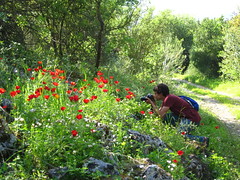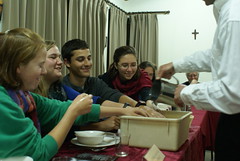Monday, April 11, 2011
My Personal Response to the Middle East Conflict
By coming to the Middle East to study culture, religion, and the ongoing Israeli/Palestinian conflict, I now understand the issues here are complicated. I realize this is not a strong conclusion to arrive at, but "complicated" is the only word I can think of to accurately describe the plight of both Arabs and Israelis in this land. The stories of both people groups cannot be understood without looking at the past and present sufferings each group has faced, and yet for any solution to work both groups must look past their suffering towards a better collective future.
We have seen signs of hope during our semester of people who have begun to move past their suffering to work towards peace. The parents of Bat-Chen speak about their daughter's vision of peace even after she was killed on her birthday in a suicide bombing in Tel Aviv. Hashem Azzah refuses to respond with violence to the Israeli settlers who attack and harass his family in Hebron. Noha Khativ, a Palestinian Arab Israeli, grew up as a minority amongst extreme prejudice. Instead of holding grudges, she decided to try her best to make the lives of her children better than her own childhood. Rather than fearing "the other," Noha set up an organization called Hand in Hand which brings Arab and Israeli children together in a bilingual school system. The children learn Hebrew and Arabic while studying one another's culture and religious traditions. Not only does this provide opportunities for the children to become friends with "the other," but the kids' parents have opportunities to interact with one another as well.
I believe that providing opportunities for Palestinians and Israelis to interact on a human level with one another is one way to break down the barrier between the two cultures. The people here have so many different labels for one another: Jewish, Christian, Muslim, secular, Orthodox, Messianic, Arab, Israeli, Palestinian, zionist, nazi, terrorist, soldier, tourist, student. These labels build up to create preconceived notions which are sometimes inaccurate and frequently difficult to look past. If people are able to see people for who they are rather than who they think others are, then peace is one step closer.
However, many obstacles stand in the way of Palestinians and Israelis interacting with one another. The most noticeable obstacle is the separation wall which falls roughly between the West Bank territory and Israel (favoring the Israeli side). This wall keeps Israelis and Palestinians from interacting with one another on a regular basis, which only entrenches the negative stereotypes over time. If I was a Palestinian and my only interaction with Israelis was with soldiers at checkpoints, I would grow to hate everything associated with the occupying force. Likewise, if I was Israeli and only heard about Palestinians when a suicide bomb attacked my people, I would associate the word 'Palestinian' with 'terrorist.' This is one trend which has the potential to alienate both sides from one another if steps are not made to encourage positive interaction between Palestinians and Israelis.
I am appreciative of the opportunity to study about the conflict from both sides of the separation wall because now I am able to associate faces of people to the words 'Palestinian' and 'Israeli.' It is difficult to match 'terrorist' with 'Palestinian' when I think of Samer Kokaly or Tent of Nations. Likewise, my mind does not jump to 'occupying force' when I think of Jared Goldfarb or Laurie with the Oranim program. Just imagine how the current situation would be different if every Israeli and Palestinian had strong connections with people across the wall. It is easy to hate the unknown because ignorance creates the strongest enemies. But if people can connect with one another, perhaps the message of 'loving ones enemies' can spread.
I believe my role in this conflict as an American Christian (and, more importantly, a human being) is to make as many relationships on both sides of the conflict as I can, then to bring my new insights back to my peers and church. Father Elias Chacour gave our group some fantastic advice: "If by taking our (the Palestinian) side makes you hate the Jews, then we do not need your friendship. What we need today is one common friend." I have tried my best during this trip to avoid becoming one-sided. If nothing else, coming here and studying this conflict has made me realize that every situation has more than one perspective. Not every situation is black-and-white, but every situation has a human aspect. If I can match faces to both sides of a conflict, just as I have done here in the Middle East, I will be less likely to harbor hate towards one side. This does not suggest that I ignore injustice in the world, but rather that I work towards justice with love for all people. I have hope for the Middle East, but I know peace will not come easily. Both sides must be willing to give something up in order to create a common future. But in my opinion, it is better to give something up for peace than to live in fear. I do not have solutions after visiting this land--only small suggestions and large questions. Like I said at the beginning, this conflict is complicated, but my visit has been priceless.
Jesus Trail/Nazareth





Sunday, April 10, 2011
Blog post from EMU website

Last week was packed with opportunities to learn more about Israeli culture with the Oranim program. We stayed in Kibbutz Ramat HaShofem, one of the first kibbutzim set up in Israel. The original kibbutz system was set up with a mix of socialist and zionist ideals, focused on communal living. This kibbutz has lost many of these original ideals, but still provided a nice setting and guest house for our group to meet and discuss our new perspectives of Israeli culture.
A highlight for many of us was the several “mifgash” (or planned conversations) where we had opportunities to meet with Israelis near our age. On the first evening, we had a chance to talk with four Israeli soldiers. Military service is mandatory for all Israeli youth after high school, which is definitely a contrast to my pacifist upbringings. By the end of our conversation, I was finally able to look past their uniform and gun to see these soldiers as people.
One of my favorite speakers this week was Noha Khativ, an Arab Israeli who grew up as a minority in a Jewish community. She helped set up an organization called Hand in Hand, which has created four bi-lingual schools for Arab and Israeli children within Israel. The classes are taught in both Arabic and Hebrew, which allows the kids to communicate with one another and learn about the other students’ cultures and religious traditions. Not only do the children have opportunities to make friends with one another, but their parents and families are given opportunities to interact as well. These relationships help build understanding between Arabs and Israelis. Hopefully these children will grow up questioning why they are told to hate and fear “the other” and rather build on the relationships they have made through Hand in Hand.
We also met with Tzvika and Ayelet Shahak, whose daughter Bat-Chen was killed in a suicide bombing attack on her 15th birthday in Tel Aviv. Their strength in spreading Bat-Chen’s dream for peace gives me hope for the entire region. Bat-Chen’s Diary has been published in six languages, and I was impressed with her messages for peace even at a young age. Rather than just grieve and become bitter about their daughter’s death, Tzvika and Ayelet converse with other bereaved families, both Israeli and Palestinian, about ending violence.
Other topics of conversation from this week included: the conflict between secular and religious Jews; the post-Holocaust Jewish mindset; and Arab identity as a minority within Israeli society. Being here and discussing Israeli issues has helped me understand the Israeli mindset, however complicated it may be.
Our group also had plenty of opportunities to bond this week over endless cups of tea, random evening card games, a delicious Shabbat dinner in an Israeli home, group presentations on the Arab/Israeli conflict, and a fun-filled Talent Show/Game Night. I am impressed with how much the group has matured and grown since the beginning of the semester, and I consistently gain new insights from them through conversation and discussion. I’m looking forward to our upcoming week in Nazareth and hiking the Jesus Trail to the Sea of Galilee!
-James


